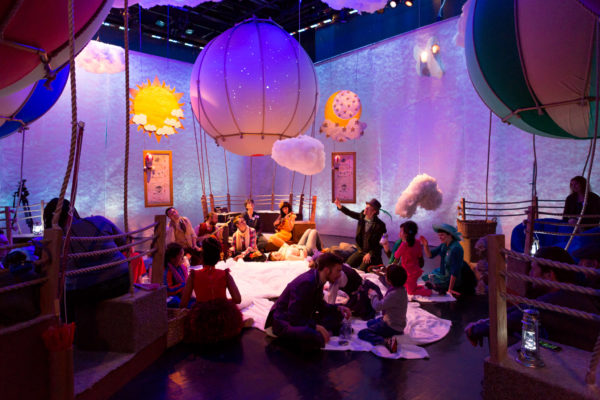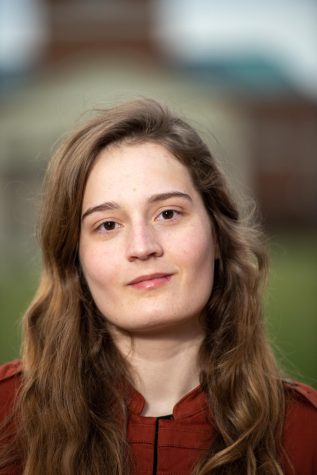Wake Forest student makes theater more accessible
Senior Cameron Michles researches how theaters can include audiences with sensory issues

Wake Forest professor Dr. Cynthia Gendrich, with the assistance of Michles, directed a performance of “Up and Away” designed to be accessible to autistic theatergoers.
January 18, 2023
The last time you were at a theater, did you think about the brightness of the lights, the levels of sound or the speed of the transitions between scenes?
While the answer for most of us is likely no, Wake Forest senior and Stamps Scholar Cameron Michles is deeply attuned to these aspects. Over the past two years, Michles has researched how to make theater more accessible while pursuing a double major in psychology and theater with a minor in neuroscience.
As Michles characterizes it, there are two main approaches toward increasing accessibility in theater. One side focuses on physically accessible theater, which is geared toward those with sight or hearing impairments or similar disabilities. Accommodations in these cases include audio descriptions, closed captions or signed performances — features of which most people have seen or heard.
Much less attention is paid to accessibility for those who are neurodivergent and have sensory issues, which is what Michles primarily researches. In many cases, people have no idea what sensory-accessible theater looks like, don’t understand its purpose or don’t even know what sensory issues are.
Sensory issues involve difficulty processing normal daily stimuli like bright lights, loud noises or the way something feels on one’s skin. Symptoms can involve heightened emotional responses such as meltdowns. The American Journal of Psychiatry estimates that 5-16% of American children have sensory processing disorder (SPD). The disorder is especially prevalent in those who have autism, Tourette syndrome, obsessive-compulsive disorder, ADHD or other learning challenges — groups that few consider when creating theater productions.
“There’s a really unfortunate presumption that people who are not included are not interested in being included, and that can poison efforts to increase inclusivity,” Michles said.
What that inclusivity looks like varies widely across productions, and the relative newness of the field means that there is often little existing data from which researchers and directors can draw.
Sometimes, adjustments are made on the side of the performance to create a more sensory-friendly experience. Actors may speak more slowly, loud and unexpected noises may be removed and lighting may be adjusted so as not to be overstimulating.
Neurodivergent-accessible performances are also not constrained by typical theater etiquette. Those expectations — like having to remain silent and still throughout an entire show — can make attending a performance too stressful for some. Other adjustments that create a more relaxed theater-going environment include designating spaces where people can step out to take a break from the show or leaving house lights fully or partially on. Theaters might also provide audiences with noise-reducing headphones, fidget toys or temperature-modifying items such as blankets.
Michles’ journey into this field began in spring of her sophomore year when she was approached by Dr. Cynthia Gendrich from the Department of Theatre and Dance. At the time, Gendrich was directing “Up and Away,” a play written for an audience of autistic children. Knowing that Michles studies both neuroscience and theater, Gendrich asked her if she would be willing to help conduct research on neurodivergent-accessible theater to inform what she wanted to direct.
“The opportunity kind of fell into my lap, but ever since that initial proposition, I’ve been following that curiosity wherever it leads me into the field of accessibility in theater,” Michles said. “As I was looking for answers to one question, I would find a few more questions I was interested in and go from there.”
Though Michles could not see “Up & Away” performed this past spring because she was studying abroad in Vienna, the stage manager sent her nightly reports about the show. She enthusiastically described reading about each audience, all known by name and seat number.
“Even though I couldn’t be there in person, it was great to hear about how such and such enjoyed the balloon scene, or how this actor made a particular accommodation for this audience member, so I was kept in the loop that way,” Michles said.
Michles continues to do research into putting on shows for neurodivergent audiences under the theater department’s guidance. Currently, that work consists of looking at theater websites, reading articles that describe sensory-accessible shows and watching these performances herself to see how the employed techniques translate into an audience experience.
Though Michles doesn’t anticipate that Wake Forest will put on sensory-friendly productions for many years — something she attributes to the newness and relative obscurity of the field — she is still taking steps to increase the visibility of her passion at Wake Forest.
One of her current goals is to add an accessibility page on the Wake Forest theater website. She intends to create what is known as a social story for the website, which is a step-by-step guide on what someone should expect during their time at the Scales Fine Arts Center. This addition would include where the restrooms are, the exact run-time of shows, how someone can find their seat and other information that could make attending a performance less intimidating for audience members. She also hopes to collect noise-reducing headphones, fidget toys, blankets and other similar items that could be stored in Wake Forest’s box office that theatergoers could borrow if it would make their experience more comfortable.
Michles further intends to collaborate with the theatre department to put on educational information sessions for students, ushers, box office staff and anyone who interacts with audiences about what accessible theater is and looks like.
While discussing the challenges of making Wake Forest theater more accessible, Michles pointed to measures the administration would need to put in place.
“The first thing that is impossible to separate from any conversation about accessibility is budget,” Michles said. “Everything comes down to someone’s money or time that needs to be compensated for. If we had a dedicated fund whose purpose is to make our space accessible, that encourages us to make these small steps and to ask what else we can do with it.”
Now that she has a solid foundation of research to support her cause, Michles intends to advocate for these measures this spring.
“Even if we’re not putting a hundred percent of our effort into making our shows fully accessible, really committing to learning more about [sensory accessible theater] is a step in the right direction,” she said. “We want to reach everyone in our potential audiences and make it clear to the public that everyone is included.”














